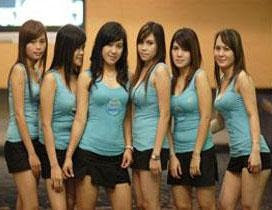I was a bit surprised last night to see that the former chief of Pemuda Pancasila and prominent lawyer and sinetron “actor” Ruhut Sitompul was now a member of President Susilo Bambang Yudhoyono’s Democratic Party.
I say surprised, cos Ruhut was for a long time a staunch supporter of Suharto’s Golkar Party.
But it seems that he has jumped ship – along with plenty of others who have now “infiltrated” the President’s Democratic Party.
So why did Ruhut leave Golkar? Not for ideological reasons that’s for sure. What matters to these nationalistic politicians is being close to power. And if that means joining the President’s party, then why not?
In fact, few countries have more political parties than Indonesia. According to Indonesia Matters, some 27 parties have already registered to take part in the next elections.
They include the Generation Party, the Young Indonesia Awakening Party, the Indonesian Archipelago Party, My Republic Party (WTF?), the Care for People Party, the Knight’s Party (sounds like fun this one!) and the Defender of the Nation Party.
Dodgy names, but there you go.
So what do they stand for? Well, no-one really has a clue, and it doesn’t matter anyway. Cos it’s got nothing to do with ideology and everything to do with gaining political power.
All much simpler in England of course. There you are either Tory or Labour. Or perhaps Liberal.
In the States it’s either Republican or Democrat.
But this is just as absurd when you think about it: as if people can be classified according to two or three political ideologies.
If you want to know what political persuasion you really are – and to see if you have more in common with Clint Eastwood or Dwight Yoakam – then try out this fascinating political quiz here.
You might even be a Libertarian like me:
LIBERTARIANS support maximum liberty in both personal and economic matters. They advocate a much smaller government; one that is limited to protecting individuals from coercion and violence. Libertarians tend to embrace individual responsibility, oppose government bureaucracy and taxes, promote private charity, tolerate diverse lifestyles, support the free market, and defend civil liberties.



Comments
Post a Comment